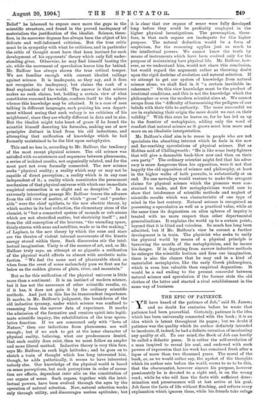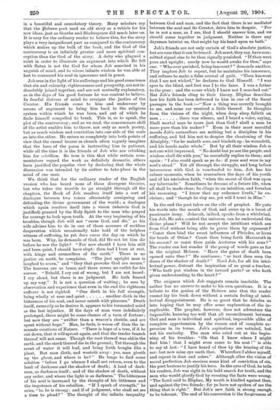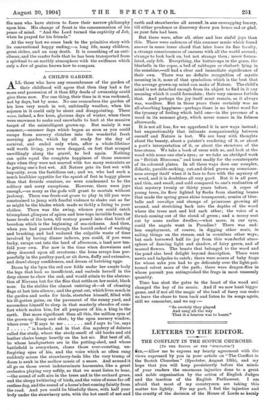THE EPIC OF PATIENCE. hi a beautiful and consolatory theory.
Many scholars say that the ebrew poet used an old story as a vehicle for his new ideas, just as Goethe and Shakespeare did much later on. It is easy for the ordinary reader to believe this, for the story plays a very insignificant part as compared to the controversy which makes up the bulk of the book, and the God of the controversy is an infinitely greater and more spiritual con- ception than the God of the story. A deity who plagued a saint in order to illustrate an argument into which He fell with Satan is not the God for whom Job searched in his anguish of mind, and to whose infinite wisdom he was able at last to commend his soul in ignorance and in peace.
Job sees in the light of his sufferings and his good conscience that sin and calamity, righteousness and prosperity, are not in- dissolubly joined together, and are not mutually explanatory, as in the days of his good fortune be was content to believe. In fearful distress of mind he arraigns the justice of the Creator. His friends come to him and endeavour by means of argument to bring him back to the religious system within which he was born, and out of which he finds himself compelled to break. This is, so to speak, the plot of the controversy ; and as we read, the consummate skill of the artist enables him to throw, not only as much poetry, but as much wisdom and conviction into one side of the scale as into the other. He enters so completely into both points of view that the casual hearer in church often vaguely imagines that the hero of the poem is instructing him in patience, while all the time it is the friends of Job who are rebuking him for rebellion. So • true is this that while certain com- mentators regard the work as definitely dramatic, others have justified the popular view by declaring that the whole discussion was intended by its author to take place in the mind of one man. - We think that for the ordinary reader of the English version- who has heard none of these divergent theories, but who takes the trouble to go straight through all the chapters, the Book of Job , resolves itself into a sort of duologue between two voices alternately arraigning and defending the divine government of the world ; a duologue which again resolves itself into a vision (wherein God is justified) granted by the Holy Spirit to the man who prayed for courage to look upon truth. At the very beginning of his troubles, though Job will not "curse God, and die," as his wife advises him to do in one of those accesses of reckless desperation which occasionally take hold of the helpless witness of suffering, he yet does curse the day on which he was born. Why, he demands of God, did He not let him die before he saw the light? "For now should I have lain still and been quiet, I should have slept: then had I been at rest, with kings and counsellers of the earth." There is no justice on earth, he complains. "The just 'upright man is laughed to scorn," and "they that provoke God are secure." The heavens are as brass, and there seems no outlet for his sorrow. "Behold, I cry out of wrong, but I am not heard: I cry aloud, but there is no judgment. He hath fenced up my way." It is not a question of waiting ; he sees by observation and experience that even in the end. the righteous sufferer is not righted. "One dieth in his full strength,
being wholly at ease and quiet another dieth in the bitterness of his soul, and never eateth with pleasure." Death-, itself, earnestly as he desires it, appears to his tormented mind as the last injustice. If the days of man were indefinitely prolonged, there might be some chance of a turn of fortune ; but now they are "swifter. than a weaver..s shuttle, and are spent without hope." Man, he feels, is worse off than the in- sensate creations of Nature. "There is hope of a tree, if it be cut down, that it will sprout again, and that the tender branch thereof will not cease. Though the root thereof wax old in the earth, and the stock thereof die in the ground; Yet through the scent of water it will bud, and bring forth boughs like a plant. But man dieth, and wasteth away : yea, man giveth up the ghost, and where is he?" He longs to find some solution "before I go whence I shall not return, even to the land of darkness and the shadow of death ; A land of dark- ness, as darkness itself ; and of the shadow of death, without any order, and where the light is as darkness." The bitterness of his soul is increased by the thought of his littleness and the impotence of his rebellion. "If I speak of strength," he cries, "lo, he is strong : and if of judgment, who shall set me a time to plead ? " The thought of the' infinite inequality
between God and man, and the fact that there is no mediatorl between the soul and its Creator, drive him to despair. "For he is not a man, as I am, that 'I should answer him, and we should come together in judgment. Neither is there any daysman betwixt us, that might lay his hand upon us both."
Job's friends are not only certain of God's absolute justice, but are sure that it can be traced. Job must, they say, have com- mitted signal sins to be thus signally punished. "If thou wert pure and upright ; surely now he would awake for thee," says one. "Who ever perished, being innocent?" demands another. They implore Job to repent, but he maintains his innocence, and refuses to make a false avowal of guilt. "Thou knowest that I am not wicked," he declares to God Himself. "I was eyes to the blind, and feet was I to the lame. I was a father to the poor : and the cause which I knew not I searched out." But Job's friends cling to their theory. Elipbaz describes 'how his faith has been delivered to him in one of the finest .passages in the book :—" Now a thing was secretly brought to me, and mine ear received a little thereof. In thoughts from the visions of the night, when deep sleep falleth. on
.men there was silence, and I heard a voice, saying, Shall mortal man be more just than God ? shall a man be more pure than his maker ? " Even in their most merciful moods Job's counsellors see nothing but a discipline in his suffering, and bid him not to despise the chastening of the 'Almighty, "for he maketh sore, and bindeth up : he woundeth, and his hands make Whole." But by all their wisdom Job is not one whit impressed. "No doubt but ye are the people, and wisdom shall die with you," he scornfully replies to them; and again : "I also could speak as ye do : if your soul were in my soul's stead." Yet all through the struggle, and long before intercourse with God is vouchsafed to him, Job has his calmer moments, when he remembers the days of his youth and of his unshaken faith, "when the secret of God was upon my tabernacle." Sometimes he dreams of a future life, when all shall be made clear; he clings to an intuition, and forsakes his reasoning. "I know that my redeemer liveth," he ex- claims ; and "though he slay me, yet will I trust in Him."
In the end the poet takes on the role of prophet. He puts his words into the mouth of God, and sums up in a burst of passionate irony. Jehovah, indeed, speaks from a whirlwind. Can Job, He asks, control the universe, can be understand the divine plans ? Will he not accept the intuitions which are from God without being able to prove them by argument ? " Canst thou bind the sweet influences of Pleiades, or loose the bands of Orion ? Canst thou bring forth Mazzaroth in his season? or canst thou guide Arcturus with his sons ?" The reader can but wonder if the pomp of words goes as far in the original Hebrew. "Have the gates of death been opened unto thee ? " He continues ; "or East thou seen the doors of the shadow of death ?" Need Job, for all his intel- lectual power, distrust the inspiration of so great a teacher. "Who bath put wisdom in the inward parts ? or who bath given understanding to the heart ? "
The enigmas which Job suggests remain insoluble. The author has no answer to make to his own questions. It is a tribute to the genius of the Hebrew . seer that the reader cannot lay his book down without a certain feeling of intel- lectual disappointment. He is so great that he deludes us into hoping that he may offer some explanation of the in- explicable. The prophet, however, does not adventure the impossible, knowing too well that all reconcilement between God and man is individual and spiritual, impossible alike of complete apprehension by the reason and of complete ex- pression in its terms. Job's aspirations are satisuied, but not his curiosity. The man who cried out at the begin- ning of his troubles : "Oh that I knew where I might find him ! that I might even come to his seat !" is ablo . to say at last : "I have heard of thee by the hearing of the ear: but now mine eye seeth thee, Wherefore I abhor myself, and.repent in dust and ashes.", Although after the vision of moral perfection Job receives some kind of conviction of sin, the poet hastens to justify his hero. In,the eyes of God, he tells his readers, Job was right in his bold search for truth, and the men who would glorify God by wresting the facts were wrong. "The Lord said to•Eliphaz, My wrath is kindled against thee, and against thy two friends : for ye have not spoken of me the thing that is right.". , But Job's new faith is _strong ,eneugh to be tolerant. The end of his conversion is. the forgiveness of
the men who have striven to force their narrow philosophy upon him. His change of front is the consummation of his peqee of mind. "And the Lord turned the captivity of Job, when he prayed for his friends."
At the very last we come back to the primitive story with its conventional happy ending,—a long life, many children, great riches, and an easy death. It is something of an anti- climax, and the reader feels that he has been transported from a spiritual to an earthly atmosphere with the swiftness which only a Jew of genius knows how to compass.




































 Previous page
Previous page